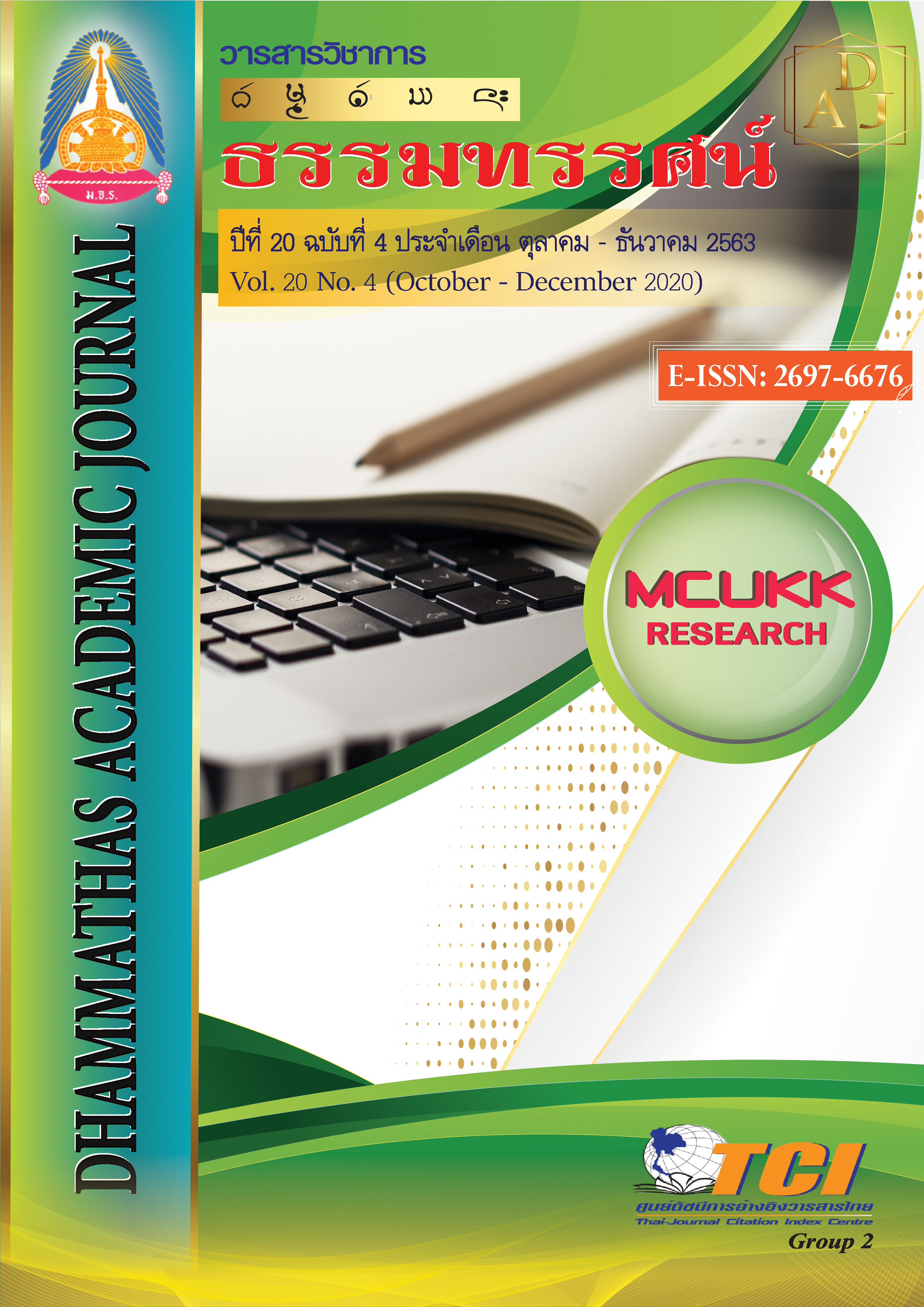The Influence of Board Characteristics on Business Ethics of Companies Listed on the Stock Exchange of Thailand: ESG 100
Main Article Content
Abstract
The objective of this research was to examine the influence of board characteristics on business ethics of companies listed on the Stock Exchange of Thailand emphasizing on ESG 100. The representatives of board characteristics consisted of three variables as follows; board financial expertise, board gender diversity, and board independence. Earnings management measured by the model of Yoon & Miller was the proxy of business ethics. Besides, five control variables were board size, owner concentration, leverage, profitability, and company size. This study collected data from secondary source belonging to 269 firm-year observations. These data were available in their annual reports, financial statements, and annual registration statements (form 56-1) of the year 2015-2018 covering 4 years. The data were analysed by multiple regression analysis technique.
The result revealed that: there was significantly statistical negative influence of board independence on earnings management. This indicated that board independence could mitigate earnings management reflecting business ethics committed. Therefore, this could imply that board independence encouraged companies in ESG100 to commit with business ethics through faithful representation of financial reporting.
Article Details
References
Choi, T. H. & Tae, J. (2011). Business Ethics and Financial Reporting Quality: Evidence from Korea. Journal of Business Ethics, 103(-), 403-427.
Damak, S. T. (2018). Gender Diverse Board and Earnings management: Evidence from French Listed Companies. Sustainability Accounting. Management and Policy Journal, 9(3), 289-312.
Enderle, G. (2004). The Ethics of Financial Reporting, the Global Reporting Initiative, and the Balanced Concept of the firm. In: G. G. Brenkert, (ed.) Corporate Integrity and Accountability. Thousand Oaks : Sage.
Healy, P. M. & Wahlen, J. M. (1999). A Review of the Earnings Management Literature and Its Implications for Standard Setting. Accounting Horizons, 13(-), 365-383.
Huang, P., Louwers, T. J., Moffitt, J., S. & Zhang, Y. (2008). Ethical Management, Corporate Governance, and Abnormal Accruals. Journal of Business Ethics, 83(3), 469-487.
Jo, H. & Kim, Y. (2008). Ethics and Disclosure: A Study of the Financial Performance of Firms in the Seasoned Equity Offerings Market. Journal of Business Ethics, 80(4), 855-878.
Khantawitc, A., Srichanpetch, S. & Chansirisri, D. (2009). Corporate governance to Create Firm Value. Bangkok : The Stock Exchange of Thailand.
Labelle, R., Gargouri, R. M. & Francoeur, C. (2010). Ethics, diversity management, and financial reporting quality. Journal of Business Ethics, 93(2), 335–353.
Lin, T. (2011). Corporate Governance Mechanisms and Earnings Management in Transitional Countries-evidence from Chinese Listed Firms. Doctor of Philosophy. Graduate School : Queensland University of Technology.
Mahachulalogkornrajavidyalaya University. (1996). Thai Tipitaka Version of Mahachulalogkornrajavidyalaya. Bangkok : Mahachulalogkornrajavidyalaya Printing House.
Mansor, N., et al. (2013). Corporate Governance and Earnings Management: A Study on the Malaysian Family and Non-family Owned PLCs. Procedia Economics and Finance, 7(-), 221-229.
Mohamad, N. R., et al., (2010). The Effects of Board Independence, Board Diversity and Corporate Social Responsibility on Earnings Management. Conference 2011 Paper. https://ssrn.com/abstract=1725925 (Accessed 1 November 2019).
Rajeevan, S. and Ajward, R. (2019). Board characteristics and earnings management in Sri Lanka. Journal of Asian Business and Economic Studies, 27(1), 2-18.
Ruangsuwan, S. (2006). Creating Stock Price: Mechanisms of Numbers and Probability Strategies. Journal of Accounting Profession, 2(1), 120-128.
The Securities and Exchange Commission, Thailand. (2012). SEC files criminal complaint against SINGHA CEO for falsifying accounts, SEC News No. 110/2012. https://www.sec.or.th (Accessed 1 November 2019).
The Stock Exchange of Thailand. (2017). Corporate Governance Code for listed companies 2017. https://www.set.or.th. (Accessed 1 November 2019).
The Stock Exchange of Thailand. (2019). Thailand Sustainability Investment. https://www.set.or.th (Accessed 6 November 2019).
Yoon, S. S. & Miller, G. A. (2002). Cash from Operations and Earnings Management in Korea. The International Journal of Accounting, 37(4), 395-412.

